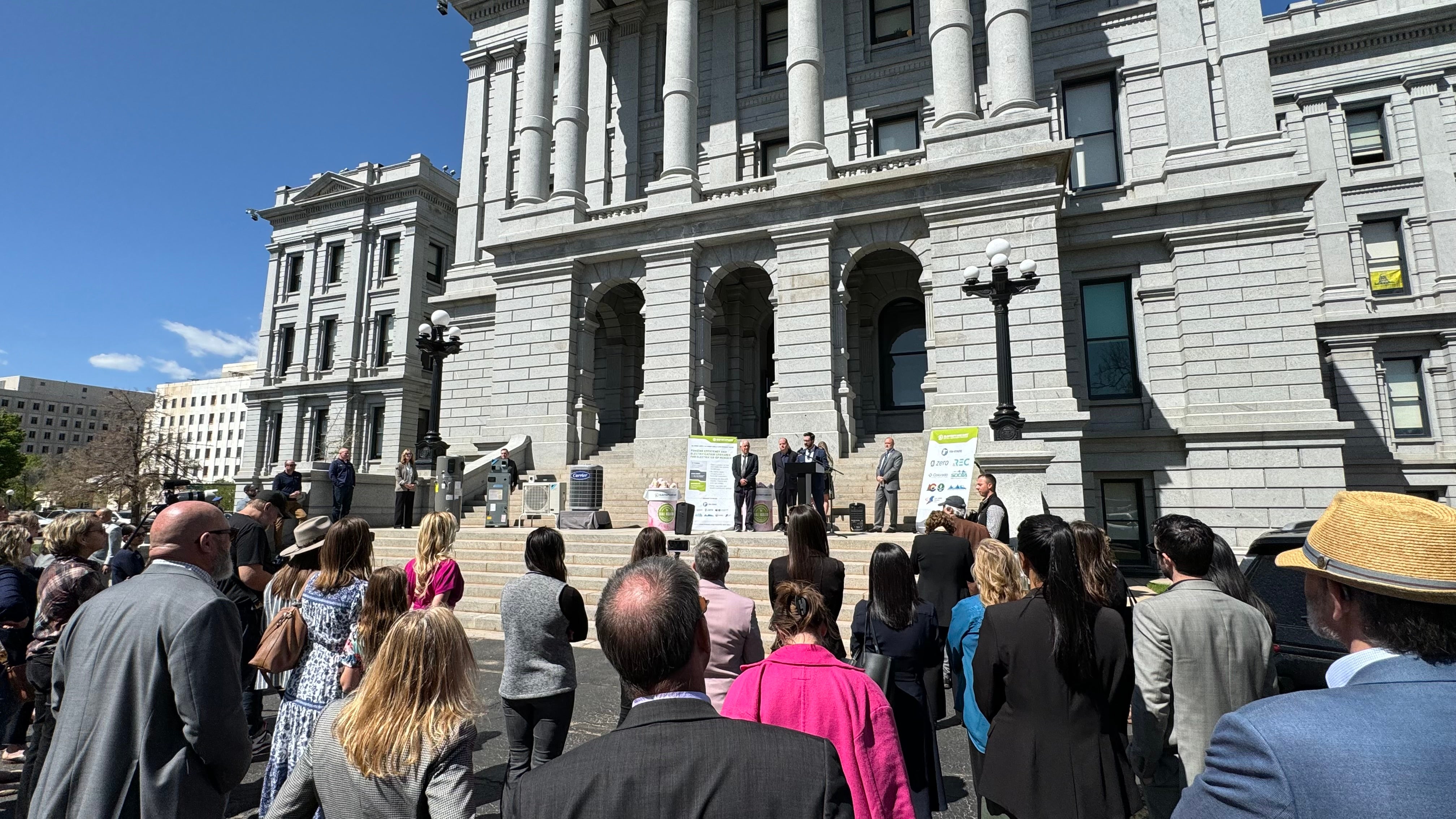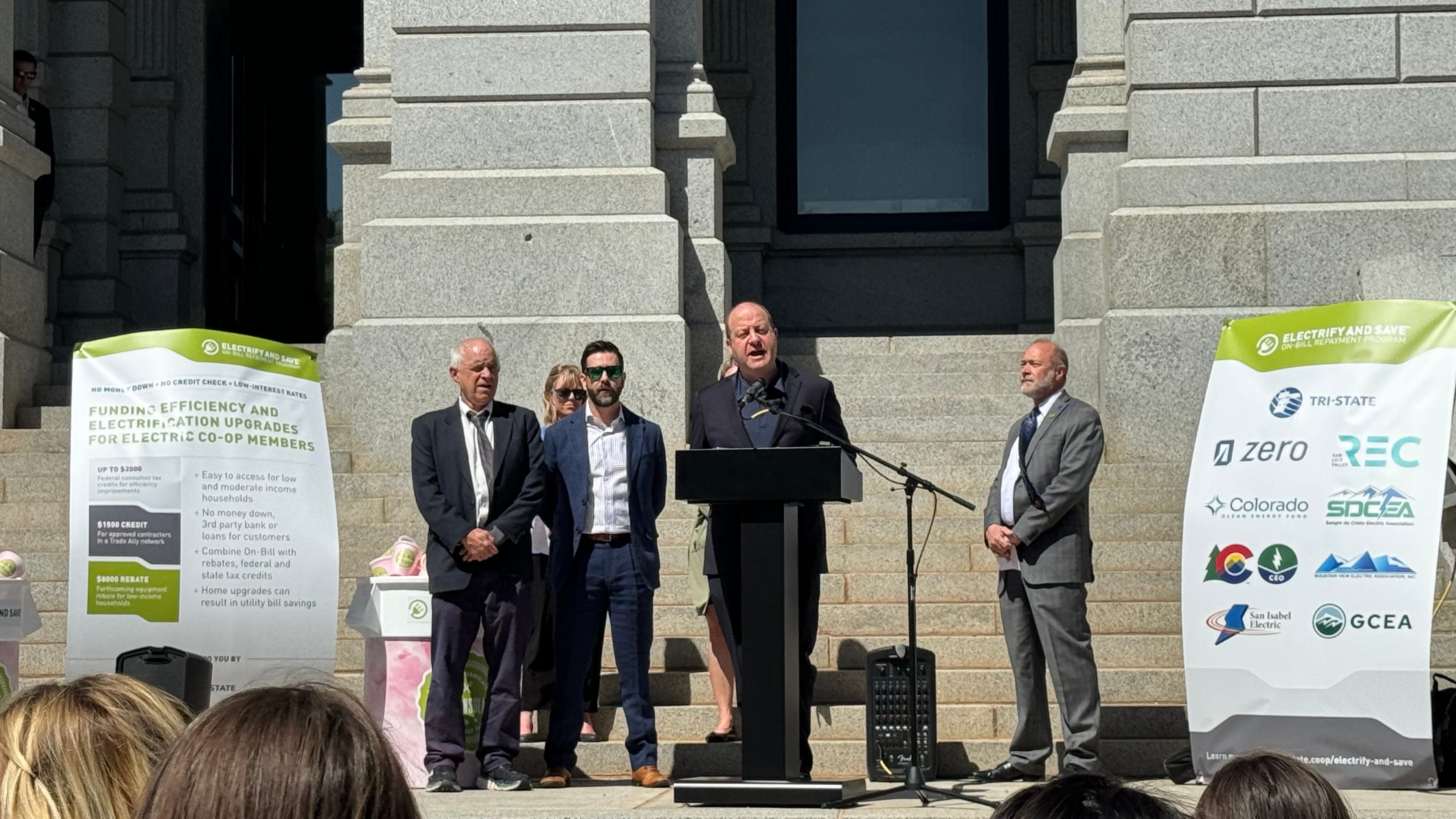New Electrify and Save On-Bill Repayment Program expands access to beneficial electrification and energy efficiency across the West
- Unique Electrify and Save On-Bill Repayment Program features no money down, no credit check and low-interest rates, breaking down barriers to accessing energy efficiency and electrification benefits, particularly for rural areas, income-qualified households, and small-businesses and agricultural communities.
- Tri-State Generation and Transmission Association, its distribution cooperative members, and the Colorado Clean Energy Fund launch the new financing program for cooperative member consumers. Colorado Gov. Jared Polis joins announcement today at the Capitol to voice support for the program.
- Colorado Clean Energy Fund will administer the program, with $50 million in support from the U.S. Department of Agriculture’s Rural Energy Savings Program.
(Broadcast quality video and photo images of the event are available for download at this link).
(May 3, 2024 – Denver and Westminster, Colo.) Rural consumers can benefit from greater access to electrification and energy efficiency through a new program announced today from members of Tri-State Generation and Transmission Association. Administered by the Colorado Clean Energy Fund (CCEF), the Electrify and Save On-Bill Repayment Program will bring more affordable energy efficiency and electrification benefits to rural consumers. The effort also will be boosted by the announcement today that Tri-State and its members have secured $75 million in loans for rural energy efficiency efforts, through the U.S. Department of Agriculture’s Rural Energy Savings Program (RESP).

In an event today at the Colorado State Capitol, Gov. Jared Polis voiced support for the On-Bill Repayment Program, which will allow member-consumers and businesses in Colorado and across the West to install home improvement efficiency and beneficial electrification measures, at no up-front cost, and repay over time through their monthly utility bill. Unlike traditional loan programs, unique underwriting criteria (rather than traditional loan underwriting criteria) assesses the consumer’s bill pay history, thereby qualifying a broader base of participants.
Eligible energy measures under the On-Bill Repayment Program include funding for new insulation, windows and doors, water heaters, heat pumps, HVAC systems, electric vehicle charging and other qualifying energy-efficient technology. The program also includes home energy assessments and vetting for authorized contractors. Because the financial obligation is tied to the service location, rather than the individual, this program also is unique from traditional consumer loan programs, in that it does not affect credit scores or create additional debt for the member consumer.
In many cases, the energy savings achieved through the newly installed measures are greater than the monthly repayment obligation, thereby saving consumer members and businesses money on their utility bill every month.
Tri-State Chief Executive Officer Duane Highley and CCEF Chief Executive Officer Paul Scharfenberger joined Gov. Polis today in announcing the program.
“With this opportunity, members of electrical co-ops that are Tri-state customers can easily update their heating and cooling to more energy efficient options without upfront costs, saving them money and supporting the state we love for generations to come,” Gov. Polis said.

Tri-State and its members, and CCEF learned earlier this week that the U.S. Department of Agriculture had approved $75 million in loans to Tri-State through the RESP, to be used on energy efficiency efforts for its members; of that amount, $50 million in loans will be used to support the On-Bill Repayment Program. The RESP provides loans to rural utilities and other companies that, in turn, provide energy efficiency loans to qualified consumers who implement durable, cost-effective energy efficiency measures.
The first phase of the On-Bill Repayment Program, initially offered in March by Tri-State member San Luis Valley Rural Electric Cooperative (SLVREC), is a standardized program developed by Tri-State, its distribution system members and CCEF. The Sangre de Cristo Electric Association (SDCEA) launched its on-bill repayment program this week, with other distribution cooperatives to initiate the program later this year. Eleven other members are planning to offer the program in the near future.
“Working together with Tri-State, our members are solving challenges and supporting the rural communities they serve” Highley said. ”One of the historic roadblocks to helping consumers and businesses embrace energy efficiency and beneficial electrification has been securing access to the capital needed to make meaningful improvements that reduce their energy costs.”
With CCEF and our members, we have a solution that provides financing in a simple, transparent and cost-effective way,” Highley said.
Beneficial electrification refers to technology that takes advantage of a reliable, affordable and cleaner electric grid, thus reducing emissions and energy costs. For example, heat pumps can heat and cool homes using only electricity and their technology is highly efficient.
With energy expertise and significant assets under management, CCEF will act as the program administrator, directing activities of the program center; recruiting and enrolling authorized contractors; and managing financing disbursements and servicing.
"
“This program will help improve the lives of our members through energy-savings and increased home values,” added Eric Eriksen, chief executive officer for SLVREC in Monte Vista, Colo., the first Tri-State member to offer the On-Bill Repayment Program. “I know this to be true because I’ve experienced the positive impacts of a similar program first-hand in Alaska.”
CCEF, as a third-party, provides the upfront funding for energy upgrades and installations, and the “repayment” or recovery of CCEF funding occurs over an agreed-upon timeframe, collected through the participant’s monthly energy bills.
Zero Homes is the operating partner for the program, providing digital assessments to educate homeowners on opportunities to improve the comfort of their home, save on their utility bills, and help them easily move through the installation process.
About Tri-State Generation and Transmission
Tri-State is a power supply cooperative, operating on a not-for-profit basis, serving electric distribution cooperative and public power district members in four states. Together with our member-owners, we deliver reliable, affordable and responsible power to more than a million electricity consumers across nearly 200,000 square miles of the West. For more information about Tri-State, visit www.tristate.coop.
About Colorado Clean Energy Fund
Colorado Clean Energy Fund (CCEF) is a 501(c)(3) nonprofit born out of a three-year collaboration among the Colorado Energy Office (CEO), the Department of Energy (DOE), and the Coalition for Green Capital (CGC). This collaboration aligned to create CCEF with a shared belief that a specialized, nonprofit intermediary was necessary to identify barriers to financing clean energy projects, bridge the gap between clean energy projects and traditional capital providers, and drive demand for these solutions by performing market engagement and development activities. Learn more at www.cocleanenergyfund.com and follow the organization on Facebook, LinkedIn, and Twitter.
Contact
Lee Boughey
Tri-State Generation and Transmission Association
(720) 670-6696
Lee.Boughey@tristategt.org
Mark Stutz
Tri-State Generation and Transmission Association
(303) 254-3183
Mark.Stutz@tristategt.org
Allie Madden
Colorado Clean Energy Fund
(714) 880-9198
allie@cocleanenergyfund.com
Related links
www.cocleanenergyfund.com
www.ccef.info/on-bill
www.tristate.coop
Certain information contained in this press statement are forward-looking statements including statements concerning Tri-State’s plans, future events, and other information that is not historical information. These forward-looking statements are subject to a number of risks, uncertainties and assumptions, including those described from time to time in Tri-State’s filings with the Securities and Exchange Commission. Tri-State’s expectations and beliefs are expressed in good faith, and Tri-State believes there is a reasonable basis for them. However, Tri-State cannot assure you that management’s expectations and beliefs will be achieved. There are a number of risks, uncertainties and other important factors that could cause actual results to differ materially from the forward-looking statements contained herein.
